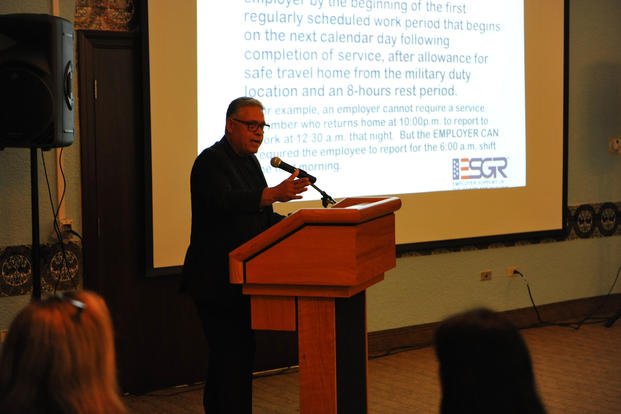Military reservists and National Guard troops have plenty to worry about when they're called away from their jobs for active duty. Will they be deployed in a combat zone? When will they return home? How will their families weather the financial storm if military pay is a fraction of civilian salary?
In the wake of the Persian Gulf War in the early 1990s, many returning reservists and Guardsmen were faced with yet another major hardship: Some employers, who had tied yellow ribbons during the war, handed out pink slips to veterans seeking their jobs back. Congress and President Bill Clinton responded by enacting the Uniformed Services Employment and Reemployment Rights Act (USERRA) of 1994, which strengthens earlier laws designed to protect the civilian jobs of servicemen and women.
Today, Reserve and National Guard troops who are called to active duty look to USERRA to protect their civilian jobs.
Rights Under USERRA
The thrust of USERRA is to guarantee reemployment for any qualifying military member who must take leave from work to report for active duty. Under the law, employers must restore workers to the same position they previously held, if possible. If not, returning workers are placed in a similar job with equal pay.
But USERRA doesn't stop at restoring soldiers and sailors to their previous work status. "You step back in as if you had never left," said Jeff Peters of Maine law firm Preti Flaherty Beliveau Pachios & Haley LLC. This means workers continue to accrue pension contributions, vacation days and most other benefits while they're serving their country rather than their employers.
USERRA's escalator principle means employees also continue to gain seniority and become eligible for promotions that their peers receive. Sometimes, employers resist giving returning employees their due.
In one case, "an employee in a police department missed a promotion test" when he was deployed, says John Michels, a partner in the Chicago office of law firm McGuireWoods LLP. "He came back to work and said, 'I would have passed the test. I want to take it now.' The legal advice to the police department was, 'Yes, you must give him a makeup test,'" said Michels, who is also a lieutenant colonel in the Air Force Reserve.
"Typically, it's not an adversarial situation," said Todd Uterstaedt, a vice president and human resources consultant at Right Management Consultants in Cincinnati. "Most companies realize their responsibilities under USERRA," added Uterstaedt, who spent most of 2002 in Tampa, Florida, as an activated Army Reserve captain tracking al-Qaida terrorists.
Some Employers Aren't Up to Speed
USERRA has provisions for a variety of contingencies, and not all of them are widely acknowledged by employers. For example, if an employee is activated and goes on leave for 181 days or more, they may take up to 90 days to apply for reemployment. "That's something employers don't understand," said attorney Charles Cragin, a partner with Blank Rome Comisky & McCauley LLP in Washington, D.C.
The Department of Defense (DoD) is working to bring employers into the loop. "We're doing a massive outreach to employers of reservists" to educate them on their responsibilities, said Lynda Valentine, manager of public relations for Employer Support of the Guard and Reserve (ESGR), a DoD-sponsored nonprofit group staffed largely by volunteers.
ESGR gets about 60 telephone complaints per week, but 95% of those are resolved without legal action, according to Valentine.
Find the Right Veteran Job
Whether you want to polish your resume, find veteran job fairs in your area or connect with employers looking to hire veterans, Military.com can help. Subscribe to Military.com to have job postings, guides and advice, and more delivered directly to your inbox.











